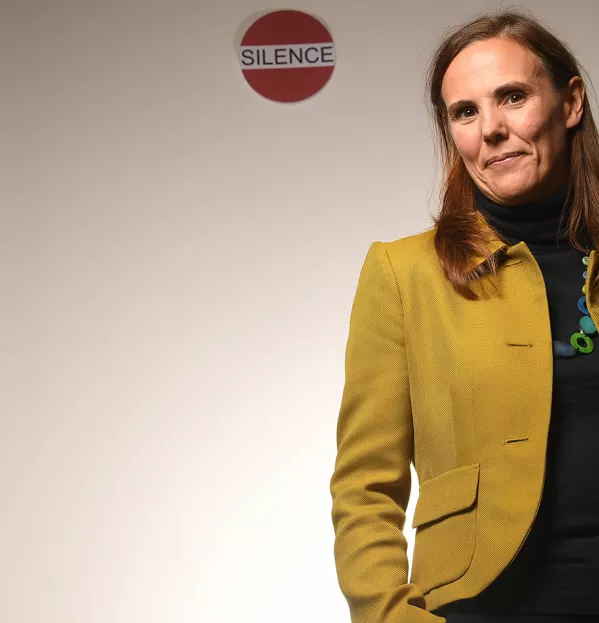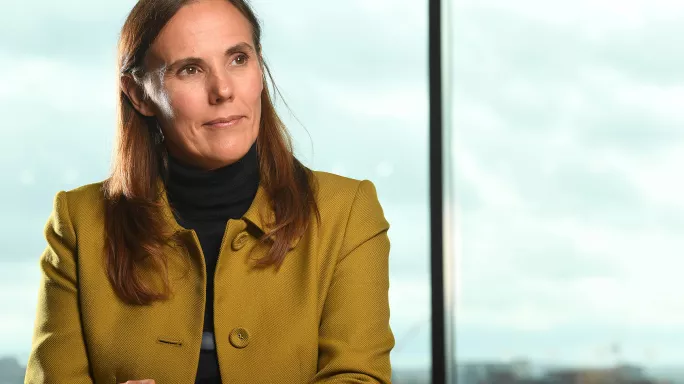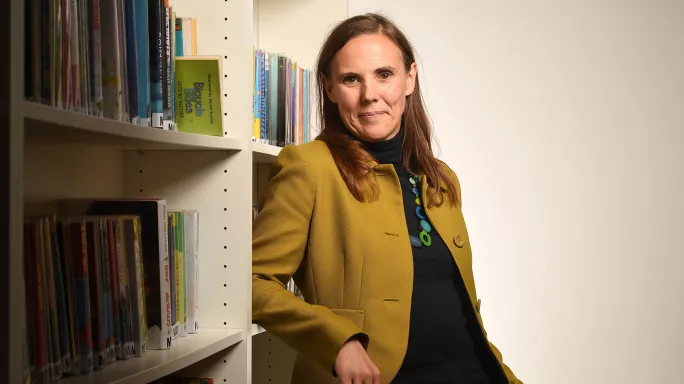- Home
- Leadership
- Tips & Techniques
- 10 questions with... Rowena Hackwood
10 questions with... Rowena Hackwood

Rowena Hackwood is the CEO of Astrea Academy Trust, a multi-academy trust comprised of 26 schools across England at both primary and secondary level.
Hackwood moved into education in 2016 having previously worked in a variety of other roles, ranging from management consultant with Ernst and Young to deputy CEO of Chesterfield Borough Council and the CEO of the Auckland Castle Trust.
After serving on the board of REAch2 Academy Trust, she took up the job of CEO at the David Ross Education Trust in 2017 before taking over at Astrea in July 2020.
She spoke to Tes for our 10 questions series, reflecting on her own time in education, why she made the move into the schools sector and why she hopes the government does not ignore the long-term impact that Covid will have on educational outcomes.
1. Who was your most memorable teacher at school and why?
I had a primary school teacher whose name was Mrs Spittal [at College House Junior School in Nottingham] and there are two things that I really got from her.
First of all, she was the netball teacher and I’m still playing netball to quite a high standard now and I run a club, so if you think about where those foundations for lifelong passions come from, that’s definitely one [from her].
- Tes 10 questions with...
- Caroline Derbyshire, of the Headteachers’ Roundtable
- Colin Bell, of the Council of British International Schools
- Dame Rachel de Souza, the children’s commissioner
The other thing is that I went on to study languages at university. When I was 10, we did a project [in her class] on what was then known as the EEC, the European Economic Community.
We had to do a project on all of the different countries and I remember being amazed that there was this thing called pasta in Italy, and the Eiffel Tower in Paris and so on, and it really raised my awareness of the wider world.
And that led me on to collecting languages as a little bit of a hobby, and if you look at where the foundations for things start, that [lesson] would be it for me.
2. What were the best and worst things about your time at school?
I’m one of those people who just loved school and it’s quite pertinent, given some of the discussions going on at the moment about EBacc and should you study English and maths for A level [because] I was one of those children that absolutely loved being able to narrow down.
It wasn’t that I couldn’t do maths and science but at my school, I was able to do A levels in French, German, Latin, and GCSEs in Spanish and Russian.
So, for me, to be able to do that was one of the great privileges of my life - to really pursue my passions.

As for the worst…I loved school so there isn’t really anything awful. But I was at a very academic school and so I did have those heart-sinking moments when you don’t do as well in things as you’d like - where you got your grade 6 in history, which was nearly a fail, and it still makes me have those “sucking in your breath” moments.
3. Why do you work in education?
The thing that drives me forward is really being close to the transformational impact. What I find in education is if you really have a heart for public service, there’s no way you can get closer to seeing the transformational impact than in the school.
If you believe in it, and you back yourself, and you really want to support colleagues around you to do the absolute best they can do to transform young lives, education is the place to be.
4. What are you most proud of in your career? And what do you regret?
When I was at the David Ross Education Trust we achieved a massive amount in the few years I was there in moving the organisation from being well below national average, by most measures, to being a really high-performing trust, particularly its primaries.
But I was hearing from a colleague, at one of the secondary schools, who told me that for the first time ever, that school has a waiting list.
It is so exciting and what I’m really proud of is not only the transformational work I did while I was leading it, but that it’s continued - my successors have taken that up, they’ve taken it on in their own way, they’ve driven it forward.
In terms of regrets…I had twins 20 years ago and I wish I’d been able to really continue to pursue the career I had at that time. But the fact I had children in that kind of era…it wasn’t possible to really do what I wanted to do and work in the way that I wanted to work and be a mum.
So I wish there had been a clearer pathway for me to pursue the career I had, at that point, towards becoming a partner in the big firm I was in at the time. But that just wasn’t a possibility for me.
That drives me on to have a point of view now that I am doing some work with the Queen Street Group on how we can create pathways into leadership for female leaders and overcome the barriers that prevent some women from pursuing their careers to the greatest possible extent.
5. Who would be your colleagues in your perfect school staffroom?
I feel strongly that the education sector is at its strongest when it acts as a melting pot for ideas, debate and challenge - and I aspire to this being available to staff at all levels.
As a CEO, I regularly work with people from all parts of the public sector, and as a leader with a wide-ranging professional background, I see the value in learning from and translating private sector practices into the public context. This could be on everything from culture, project management, organisational transformation to staff engagement or communications.
As such, an ideal staffroom would be a place for genuine peer support, challenge and collaboration, where the knowledge of all staff is used to help solve problems and uncover new opportunities - accompanied, of course, by the best coffee!
6. What would you say are the best and worst aspects of our schools system today?
The best aspect is that the intentions are true. I don’t think I’ve ever come across anybody who is in education for themselves. I think everybody is in it because they’re passionate about trying to support children to learn and try and live successful lives.
[The worst aspect] I think is that there is a huge disconnect between what is stated at policy level and what happens on the ground, and I think having that conversation in an honest way that allows people to speak without it sounding like complaining or focusing on problems…is a problem in the sector.
What I get frustrated by is you have a lot of expert, highly motivated people who end up becoming demotivated and disillusioned, and I think, as leaders, we need to work really hard to crack that.
7. Your own teachers side, who in education has influenced you the most?
I think it’s really critical, as somebody who has come in from outside of education, that I read a lot and have sufficient knowledge to be a credible education leader, even though I’m not a leading classroom practitioner.
From that, ED Hirsch is very influential on what I do. I’m fundamentally committed to a knowledge-rich curriculum and the importance of the acquisition of knowledge; the acquisition of language particularly, given that many of the communities that I serve are really disadvantaged, and we can see that, over lockdowns, disadvantaged children have become more disadvantaged because the kind of language penalty that disadvantaged children have when they start school has had two years added to it to due to time they’ve spent at home.

That is through no fault of parents but it might be that a child who speaks English as an additional language simply hasn’t spoken very much in the way of English during the entire Covid period.
So to come to school with that further language penalty that they would not have otherwise had - that means I am absolutely committed to the importance of a knowledge-rich curriculum in our schools.
8. If you became education secretary tomorrow, what would be the first thing you would do?
The key thing for me, which is missing at the moment, in a context of talking about a fully academised system, is a plan for how we’re going to get there.
If we talk about the importance of a system that is coherent and to the benefit of every child, and yet we’ve created a system that is fragmented at its heart and lacks intentionality in its design, we are barking up the wrong tree.
So I would want to get there by getting the best brains that we’ve got from the system around the table to talk about how we could do this to the best advantage of children…because this has to be about what’s best for the children in the communities that we serve.
The other thing I would do, and which I will bang the drum on, is there is a long tail of legacy Covid that we are really quick to forget about, because everybody wants Covid to be over.
But Covid is not over. In fact, in the last couple of weeks of term, we still had lots and lots of members of staff off with Covid.
Furthermore, the impact of Covid in terms of undiagnosed special educational needs, in terms of reading deficits among our youngest children, in terms of behaviour deficits among our children going to secondary school, in terms of a whole heap of things that massively disproportionately impact on our most disadvantaged communities, is massive.
So we have got to not downplay the long-term impact of Covid.
9. What will our schools be like in 30 years’ time?
My wish is for a system where we’re not talking about successful schools and unsuccessful schools, we are assuming all schools continue to improve their performance, and every child can be successful.
I hope it’s fad-free. I hope it’s knowledge-rich. I hope that we don’t lose that truly brilliant British thing that we have around a really enriched curriculum, with music, sports and the arts wrapping around core academic subjects.
I really hope we continue to celebrate a culture of expertise, too.
I know colleagues at work in higher education that are really worried about the broadening out of the key stage 5 curriculum and whether or not that then reduces the ability of children to be able to be successful in higher education.
So I really hope you continue to have a system where children can pursue their expertise and their loves and their passions in a way that doesn’t mean that they have to be generalists right away through until the point at which they leave school.
10. Who has made the biggest difference to education in the past 12 months?
I think there’s been a growth in the voice of the multi-academy trust in the education system over the past two or three years, which I think has been driven a little bit by some of the unions and I think it’s been driven a lot by the Confederation of School Trusts.
But I think during Covid we saw a massive growth in collaboration between trust leaders and so while I can’t pick one particular person, I think this idea of having a collective voice system has really grown over the past couple of years, through leaders supporting leaders and CEOs collaborating with other CEOs and sharing openly.
I think I’ve seen, in the five years that I’ve been in the system, a real sea change in the appetite that leaders have to collaborate with one another and to be more open with one another.
Rowena Hackwood was speaking with Dan Worth
You need a Tes subscription to read this article
Subscribe now to read this article and get other subscriber-only content:
- Unlimited access to all Tes magazine content
- Exclusive subscriber-only stories
- Award-winning email newsletters
Already a subscriber? Log in
You need a subscription to read this article
Subscribe now to read this article and get other subscriber-only content, including:
- Unlimited access to all Tes magazine content
- Exclusive subscriber-only stories
- Award-winning email newsletters



